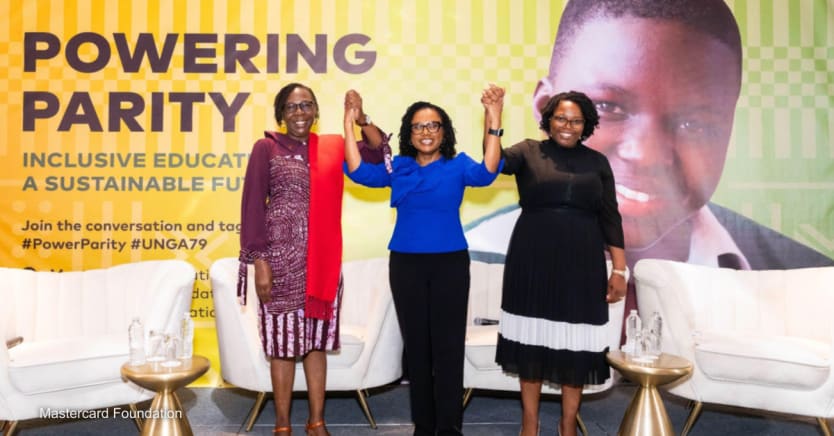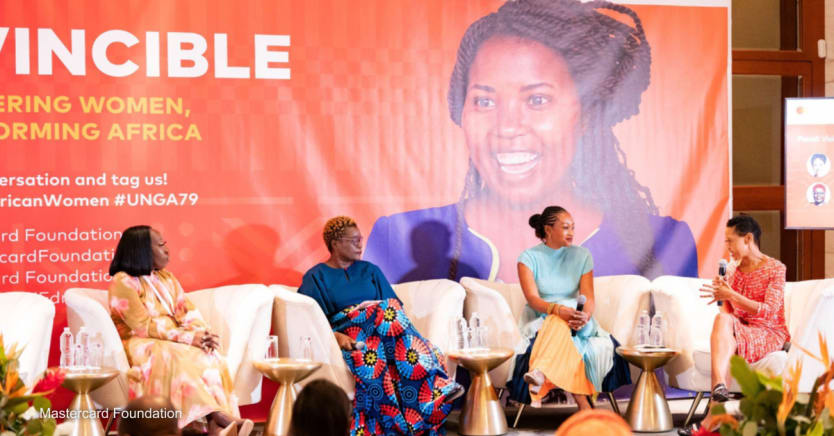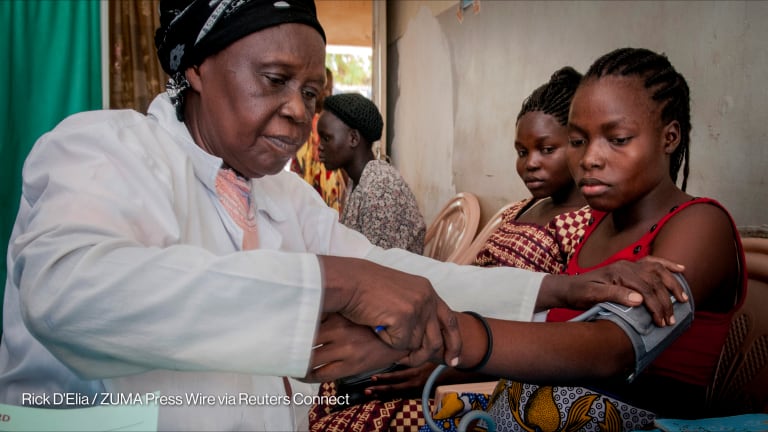
“African women are holding us up.” These were the words of Julie Gichuru, founder and CEO of the Africa Leadership and Dialogue Institute, at a United Nations General Assembly side event hosted by the Mastercard Foundation. Yet they are continuously neglected as countries fail to invest in their education or remove the barriers preventing them from accessing employment opportunities. This disregard translates into huge economic losses for countries.
According to research produced by McKinsey & Company and commissioned by the Mastercard Foundation, tackling systemic barriers to the participation of young women in Africa’s workforce could generate an estimated $287 billion for the global economy by 2030. “When sleeping women wake, mountains move,” Gichuru told event attendees.
The barriers include schools without toilets to support menstruating girls, limited access to contraception leading to adolescent pregnancy, and restricted access to financial services for women. Women also often bear the burden of care, both of children and the elderly, as well as household chores. The report estimates that addressing the burden of care could enable 11.4 million young women to engage in work activities by 2030.
Currently, only 26% of African girls complete secondary school, and women in the region spend 3.4 more time in total doing unpaid care work than their male counterparts. This work, which might include cooking, cleaning, collecting water, or looking after children and elders, prevents them from working or going to school.
“We know when they have access to education, young women are able to acquire skills and learning and when they transition into the workforce they make outsized contributions for their families, communities, and their countries,” said Reeta Roy, president and CEO of the Mastercard Foundation.
Redressing the balance, investing in women and girls, and advancing equitable access to opportunities were at the fore of the program of events hosted by the Mastercard Foundation during UNGA. Attendees agreed that while the Sustainable Development Goals put countries on a path to progress, alongside other mechanisms such as the Continental Education Strategy for Africa and Africa’s Agenda 2063, there is too much talk and not enough action when it comes to achieving gender equality in Africa.
“It requires intentionality,” said Marieme-Esther Dassanou, director of gender programs at the Mastercard Foundation, explaining that in many countries this is still lacking. “There’s not the Africa we want if it’s flying with one wing.”
With this in mind, across the day’s two main events, Powering Parity — Inclusive Education for a Sustainable Future, and Invincible: Empowering Women, Transforming Africa, government officials, innovators, and private sector leaders shared what they believe needs to happen to keep young women in school, equip them with market-relevant skills, and enable their transition to dignified livelihoods. These were the takeaways from the day.
1. Lack of data is part of the problem
A lack of accurate data masks the severity of inequality, making it easy for governments to continue to neglect the issue. In Ethiopia, for example, the Minister of Education Berhanu Nega shared that inaccurate data on the state of education has been the country’s biggest hurdle. Data showed that around 60% of students were passing national exams and getting a leaving certificate but “almost everyone in the country knew those numbers were incorrect,” Nega said. After some probing, they discovered that the pass rate was just 3.2% and that cheating and result manipulation were obscuring the results.
Having this knowledge today acts as a starting point for the country to ensure its youth, including women and girls, are getting the quality of education they need. The pass rate remains low in Ethiopia at around 5%, said Nega, but they now have accurate data on which to address the education problem.
A variety of speakers said that aside from educational data, governments should make data on women's access to financing available. It’s estimated that women’s startups only receive 2% of venture capital investment in Europe and the United States. Having this figure available in Africa might create the impetus to increase that number.

2. Change starts in the policy environment
“Every day we’re trying to fix African women instead of trying to fix these systems,” Jemimah Njuki, chief of economic empowerment at UN Women, told the room. She explained that many countries lack the policy infrastructure that would allow women to thrive.
For example, in Kenya and Cape Verde, UN Women is supporting the implementation of national policies that encourage the redistribution of unpaid care work and see the creation of national care service networks. “We’re working with the African Union Commission to make sure this is across the whole continent,” said Njuki. In Nairobi, she said, vouchers for childcare have been shown to increase employment among mothers living in the slums by 8.5%. Initiatives like these address the burden of care and could enable 11.4 million young women to engage in work activities by 2030.
“This would free up women’s time and allow them to pursue educational and economic opportunities,” Dr. Jamila Bio Ibrahim, the then-minister for youth development in Nigeria, explained. “We must create an environment … where young girls contribute and their contributions are recognized and rights protected.”
Other policies should focus on accelerating financial inclusion, Ibrahim said. “Financial services empower women to start businesses and expand enterprises.”
3. Funding must follow
Policy then needs to be combined with financial investment, said Haja Ramatulai Wurie, Sierra Leone’s minister of technical and higher education. “National ownership means national investment,” she explained, adding that as an example of this, Sierra Leone has created a technical and higher education investment fund in which the government invests 22% of its national budget into education. “What you invest in, you protect,” she said.
Njuki also encouraged countries to seek support from financial institutions to address inequity. Every country in Africa has access to a development bank, she said, explaining that while infrastructure historically conjures images of roads and bridges, it does in fact include care and workspaces. Funding from banks, such as the African Development Bank, could be used to create more inclusive spaces that facilitate women’s ability to work and go to school. For example, the construction of toilets within a school would make it easier for girls to attend while menstruating, while child-friendly spaces in work environments could make it easier for women to earn. “How is it we are still building markets in Africa with no childcare facilities?” Njuki asked.
Additionally, companies can also invest, said Wurie. In Sierra Leone, she said, they are encouraged to co-fund educational initiatives as an investment into their future workforce. The McKinsey report highlighted that private sector-led approaches alongside government-funded models focused on expanding childcare centers and employer-provided childcare could create over 11 million jobs in Africa by 2030.
At the event, the Mastercard Foundation announced it would channel a further $360 million into supporting 70,400 women and girls in completing education, starting their own businesses, or accessing employment opportunities. “The impact of these initiatives … will actually touch over 3.3 million young women and men,” said Tina Muparadzi, executive director of education and transitions at the Mastercard Foundation. The foundation will channel this funding through existing partnerships with two women-led and regionally-based NGOs, the Campaign for Female Education, or CAMFED, and the Forum for African Women Educationalists, over the next seven years.
4. There are already several examples of positive change
While gender disparity and lack of educational inclusion are still holding African economies back, attendees listed numerous projects that are making a difference and could be replicated.
One country example is Namibia. McKinsey's report spotlighted the country as a key model for other African nations to follow. Prioritizing the economic benefits of gender equality, it increased women's economic contribution to its gross domestic product from 40% to 42% in five years, mainly by changing property and asset rights and setting education targets via a national gender policy.
Sierra Leone’s creation of the Ministry for Technical and Higher Education is another example of positive change. Within that, it is investing in online learning and vocational training. “There’s a misconception that vocational training is for dropouts,” Njuki said, explaining that the ministry aims to change that. Working with the World Bank on a labor market survey, it identified sectors relating to the national development plan and then asked those sectors what skills they’d like to see in future employees. The ministry will then adapt education offerings to cater to those needs.
5. Technology can help plug gaps
Yeukai Mlambo, executive director of African initiatives at Arizona State University, highlighted the potential of technology to bring solutions to scale and empower women in the workplace. The McKinsey report highlights that the information, communication, and technology sectors in Ethiopia, Ghana, Kenya, Nigeria, Senegal, Rwanda, and Uganda already jointly employ 64,000 young women, with the potential for that to grow. Women just need the opportunities to acquire the skills necessary.
With that in mind, ASU and the Mastercard Foundation have developed an online lifelong learning platform to scale access to job skills, mentoring, internships, and employment opportunities across Africa. This helps to deliver learning at scale, said Mlambo, adding that 70% of its platform users are women.
Areej Noor, founder and CEO of media and insights company STATEMENT, shared how it’s also training women in the region in the modern methods of filmmaking, creating paths to employment but, at the same time, facilitating the creation of content on Africa from Africans themselves.
“The future of work is digital and women must be empowered to take these opportunities,” Ibrahim said.
To learn more about Young Women in Africa: Agents of Economic Growth and Transition, please access the report here.








